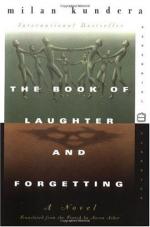|
This section contains 1,465 words (approx. 4 pages at 400 words per page) |

|
Laughter
Throughout the novel, laughter is a common theme that reappears in a variety of forms. Kundera analyzes and discusses the varieties of laughter and the situations in which they can appear.
The laughter Jan nearly experiences at Passer's funeral and at Barbara's party represents the kind of laughter that is diabolical and inappropriate. Kundera describes the birth of laughter as when the devil emits shrill and spasmodic sounds at a feast to represent the mockery of the world and undermine God and His creation. In response, an angel mimicks the sound, but perverts its original meaning to be laughter that rejoices in the world and its order and wisdom. In this way, laughter can be either angelic or devilish.
When Michelle and Gabrielle cry and then turn to laughter after being publicly mocked, their laughter and ring dance symbolize an acceptance and celebration of the world, which causes...
|
This section contains 1,465 words (approx. 4 pages at 400 words per page) |

|




